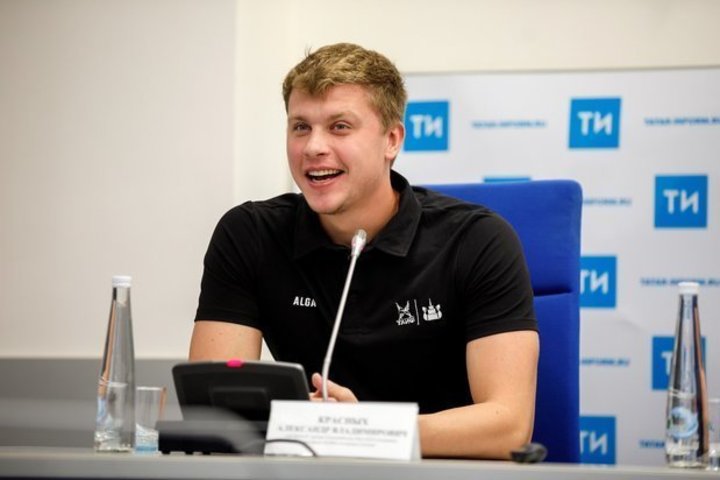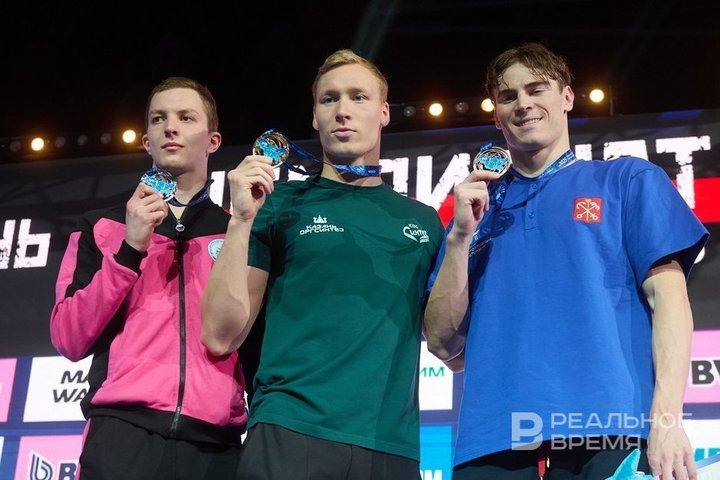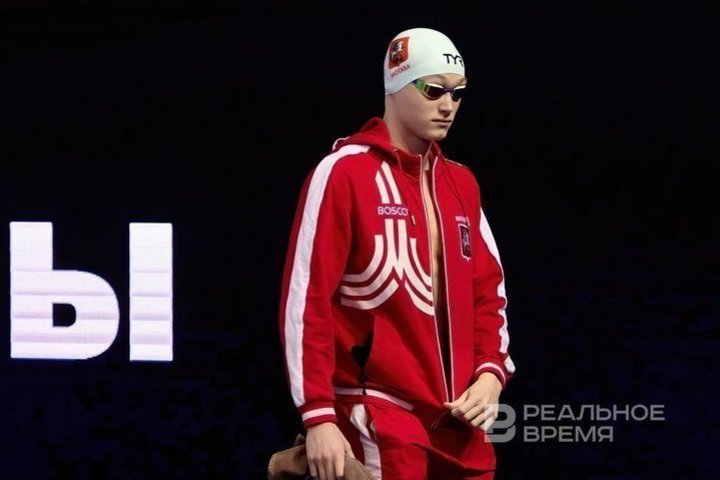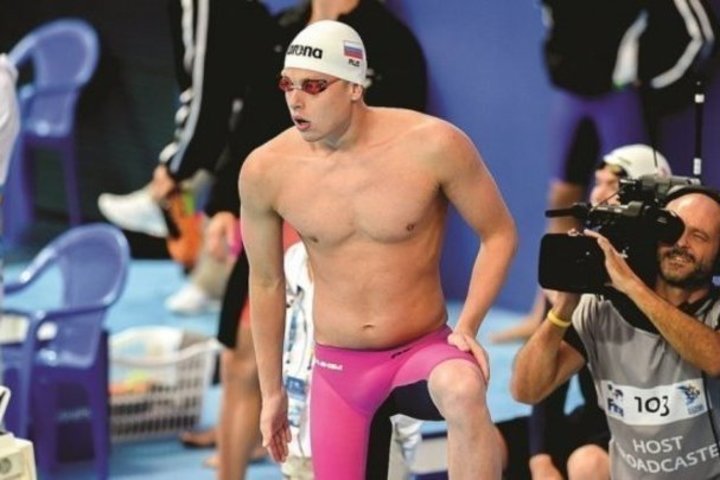Alexander Krasnykh: ‘I speak about the 4x200m relay, the so-called pride of the nation, with pain’
Kazan swimmer, Olympic silver medallist about the state and prospects of Russian swimming

In June, the strongest pupil in the history of Tatarstan swimming, Alexander Krasnykh, will turn 30 years. His colleagues in the swimming workshop, who will return to the international arena in July taking part in the World Aquatics Championships in Singapore, should bring him a gift for the round date. Realnoe Vremya’s correspondent managed to squeeze into the champion's busy schedule, talk to him and ask Alexander to assess the level of readiness of Russian swimmers based on the level of their performance at the Russian Championships in Kazan.
“The National Championship left a mixed impression”
Alexander, the Russian Championship in Kazan, which you commented on for Match TV, smoothly flowed into the National Championship in Saransk. How do you rate the performance of the strongest Russian swimmers and the results of the Tatarstan swimmers?
The National Championship left a mixed impression. On the one hand, we saw good results from our sprinters. According to the forecasts for the World Championship, for the same Universiade, for the World Championship, where our strongest swimmers were selected, there are no questions. In this regard, my mood is upbeat.
At the same time, we had quite a disastrous performance by middle-distance freestyle swimmers — not what we would like to see. And good results from middle-distance crawlers — after all, Russian middle-distance crawlers had glorious traditions in both the 400 and 200 metres. God bless him, with the 800 or 1,500m, the results there even before our suspension were not wow. But our average crawl has been good in recent years, and now it has let us down. I think the problem is related to the fact that famous guys burned out because they really wanted to show themselves. The question I would like to ask the previous management of the national team: where did the youth who were in the training group go?
This is a question for the previous coach Sergei Chepik or someone personally from the coaching staff?
I don’t know who was now responsible for preparing the national team, and who was in charge of the reserve. But the result is obvious: no one was selected for the World Championships in the 200 and 400 metre freestyle.
Maybe I can refer to the well-known saying: everything flows, everything changes, and draw parallels with the 4 x 200 metre freestyle relays, when Tatarstan swimmers were always among the prize winners, starting with the men's quartet. Then they faded into the shadows, and the women's quartet became one of the leaders. Now they are left without medals, but the juniors showed themselves brightly at the championship in this distance.
The juniors swam very well now. I liked the way the guys went through the layout, and in general the density of our results shown by the guys in their stages. It was nice to see, it made me happy. In general, Tatarstan had a middle crawl, I remember that I won the Russian championship as part of the relay, or was regularly among the prize winners. Now we see that a change has come to regain their positions in the middle crawl. If the guys continue to develop good training, then we can expect decent results.

“Sofia Diakova did everything great, really well done”
Returning to the national championship — we had a failure in the 200 and 400 metres. At the same time, it is necessary to immediately remove the old guys from the equation, that is, MIkhail Dovgaluk, and Ivan Giryov, and Mikhail Vekovishchev, who showed some fatigue. The question is where their replacement is in these same distances. Despite the fact that in general, young people are now demonstrating themselves well in other types of the program.
I am saying this with pain, since Russia had a worthy 4x200 metre relay, the so-called pride of the Nation. This relay has always been in the prizes for us, probably since the 2017 World Championship in Budapest, and before that it finished near the podium.
We will return to the Russian national teams later, but for now, evaluate the results of the leaders of the Tatarstan national team at the adult championship.
Sofia Diakova did everything great, really well done. I really like how she looked, how everything is going for her at the moment. It is clear that good preparation for the championship was carried out. The spectators were able to see the results of this work at test starts, which the Russian championship became. There is no stagnation in results yet, although at this age it is too early to talk about stagnation.
Regarding Andrey Minakov, it was gratifying to see that he finally approached his best result. It will be interesting to see what happens next at the World Championship. I think Andrei has drawn conclusions about why things have not worked out lately. If you look at the 2019 World Championship, where Andrei was second, then this year will be more difficult. The guys' results at the world level have grown significantly. Do not forget that this World Championship is being held in the post-Olympic period. Traditionally, as once in a while new stars appear, as we were shown by the short world championship in Budapest. We saw many new stars. Now the Americans have started in domestic competitions, and their results are impressive.
Let's get back to the national championship. When we were suspended from international starts, there was an option to transfer the system of training Russian swimmers to the championship itself, and not to international starts, as before. As a result, the swimmers changed the structure of training with peaks in form. Has their mood changed now that the championship has regained its status as a qualifying one?
The training has not changed much. There were no international starts, but the training process was conducted with an eye to the summer competitions. The only thing is that the Russian championship at that time somewhat lost its position, ceasing to be a qualifying one. Then it seemed like a more passing start, and the guys were preparing for the summer start, because it is in the summer that they achieve their best form. This is also due to biological rhythms.
In general, there were no changes, now the situation has returned to normal. The guys really wanted to show everything they were capable of at all distances, but, unfortunately, it didn’t work out everywhere.

“I’ll be interested in watching one of Ilya Borodin’s first international starts”
We’re standing on the shaky surface of forecasts. Chikunova has already managed to start at international starts, but Lifintsev, Kornev, Misharina should debut in the long course, remembering that they already started in the short course at last year’s World Championship. Who do you expect progress from?
I’m interested in watching one of Ilya Borodin’s first international starts of this level. He’s been extremely unlucky before, for certain reasons he couldn’t start at the Tokyo Olympics, where he qualified. I’d like him to realize himself at the highest level.
Regarding Yevgeniya Chikunova, we can remember that her debut already took place when she finished fourth twice at the 2021 Olympics. Regarding the international debut of our other athletes, I will say that for some, the debut is loud and memorable, for others it is not. There can be many reasons for this, including those that arise with health, and the internal state affects — jitters.
Previously, I was at the national championships in person and did not know that you were trying yourself as a commentator. I heard only now when I decided to watch the start of the Russian championship on TV.
The first time I commented was at the 2018 European Championships in Glasgow, where I did not compete, going with the support group, and tried my hand at the commentary console during the morning sessions. Thanks to Denis Pankratov, who gave me this great opportunity.
Then I had amateur experience commentating on the Olympic Games, which were broadcast only on Vk.com. And after that I was invited to commentate on official starts, my debut was at the World Short Course Championships, when I worked for Match TV. Now I have worked at the Russian Championships from the first to the last day, plus I also worked at the Russian Championships. The experience is interesting, I like it. I would like to develop in this further, immersing myself even more in swimming. I am interested in telling our viewers about aspects of swimming, about the specifics, adding a professional view to the commentator's — this is how it is at all major competitions, when a professional commentator and an expert sit at the microphone. I have performed at the expert level so far, but I will study and move on to the level of a professional commentator.

“I will assume that the fifty-kopeck piece was introduced into the Games program so that the Americans would take more medals at the Olympics”
A question from the category of observations. As is known, in swimming, it is the breaststroke swimmers who are the most disadvantaged, since freestyle, backstroke and those who specialize in butterfly can, one way or another, combine starts in these three types of swimming. Plus, there is medley swimming. It unexpectedly turned out that breaststroke also has its trump card — longevity. Yulia Yefimova and Vitalina Simonova, as well as Oleg Kostin and Andrey Nikolayev who are over 30. Moreover, the girls began competing at the age of 14, and their career, which has stretched for 20 years, is a kind of compensation for the fact that they cannot prove themselves in other swimming disciplines.
In my observation, swimming in general is “aging.” Leading athletes are becoming more experienced, continuing to be competitive. In addition to breaststroke, this is noticeable in short distances. Look, among the Olympic medallists and world champions there were Brazilians who were not just over 30, but already over 40. Bruno Fratus won gold in Tokyo at 32, Nicolas Santos became world champion at 42.
On the other hand, I want to draw your attention to the fact that at the Olympic Games in Los Angeles they will compete in all types of swimming at 50-meter distances, and not just in freestyle, as was the case before. And this will stimulate older representatives of swimming because there is a whole galaxy of sprinters who have the opportunity to qualify for the Olympics, having prepared themselves only for the 50m. The largest competition.
Is this expansion of the Olympic programme the work of new IOC President Kirsty Coventry?
Here we are on the ground of speculation. I have an assumption that the 50m was introduced so that the Americans would have a chance to win more medals at the home Olympics. There is nothing shameful in this, we remember how karate was included in the program at the Tokyo Olympics, which was then removed from the program. Or, for the Sochi Olympics, the Russian organizers did not introduce new sports, but expanded the range of existing ones. For example, team competitions for figure skaters, in order to have a better chance of winning home awards. We need to see how the situation develops further, I suspect that swimming should not be ahead of athletics in the number of awards (there were 37 sets in Paris) — the Queen of Sports”(48 sets). Whether the fifty-kilometres will remain after Los Angeles or whether some long-distance distances will be shortened for their sake is still a question.